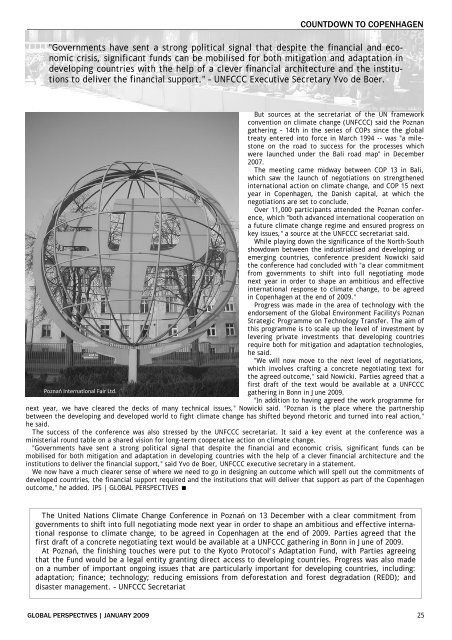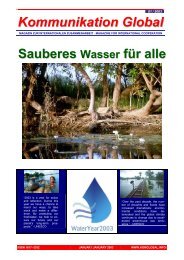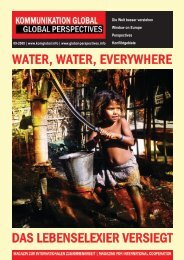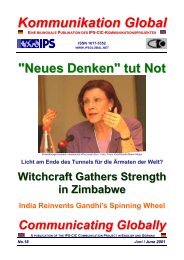GLOBAL PERSPECTIVES | KOMMUNIKATION GLOBAL - 01 | 2009
GLOBAL PERSPECTIVES | KOMMUNIKATION GLOBAL - 01 | 2009
GLOBAL PERSPECTIVES | KOMMUNIKATION GLOBAL - 01 | 2009
Create successful ePaper yourself
Turn your PDF publications into a flip-book with our unique Google optimized e-Paper software.
COUNTDOWN TO COPENHAGEN<br />
"Governments have sent a strong political signal that despite the financial and economic<br />
crisis, significant funds can be mobilised for both mitigation and adaptation in<br />
developing countries with the help of a clever financial architecture and the institutions<br />
to deliver the financial support." – UNFCCC Executive Secretary Yvo de Boer.<br />
But sources at the secretariat of the UN framework<br />
convention on climate change (UNFCCC) said the Poznan<br />
gathering – 14th in the series of COPs since the global<br />
treaty entered into force in March 1994 -- was "a milestone<br />
on the road to success for the processes which<br />
were launched under the Bali road map" in December<br />
2007.<br />
The meeting came midway between COP 13 in Bali,<br />
which saw the launch of negotiations on strengthened<br />
international action on climate change, and COP 15 next<br />
year in Copenhagen, the Danish capital, at which the<br />
negotiations are set to conclude.<br />
Over 11,000 participants attended the Poznan conference,<br />
which "both advanced international cooperation on<br />
a future climate change regime and ensured progress on<br />
key issues," a source at the UNFCCC secretariat said.<br />
While playing down the significance of the North-South<br />
showdown between the industrialised and developing or<br />
emerging countries, conference president Nowicki said<br />
the conference had concluded with "a clear commitment<br />
from governments to shift into full negotiating mode<br />
next year in order to shape an ambitious and effective<br />
international response to climate change, to be agreed<br />
in Copenhagen at the end of <strong>2009</strong>."<br />
Progress was made in the area of technology with the<br />
endorsement of the Global Environment Facility's Poznan<br />
Strategic Programme on Technology Transfer. The aim of<br />
this programme is to scale up the level of investment by<br />
levering private investments that developing countries<br />
require both for mitigation and adaptation technologies,<br />
he said.<br />
"We will now move to the next level of negotiations,<br />
which involves crafting a concrete negotiating text for<br />
the agreed outcome," said Nowicki. Parties agreed that a<br />
first draft of the text would be available at a UNFCCC<br />
Poznań International Fair Ltd.<br />
gathering in Bonn in June <strong>2009</strong>.<br />
"In addition to having agreed the work programme for<br />
next year, we have cleared the decks of many technical issues," Nowicki said. "Poznan is the place where the partnership<br />
between the developing and developed world to fight climate change has shifted beyond rhetoric and turned into real action,"<br />
he said.<br />
The success of the conference was also stressed by the UNFCCC secretariat. It said a key event at the conference was a<br />
ministerial round table on a shared vision for long-term cooperative action on climate change.<br />
"Governments have sent a strong political signal that despite the financial and economic crisis, significant funds can be<br />
mobilised for both mitigation and adaptation in developing countries with the help of a clever financial architecture and the<br />
institutions to deliver the financial support," said Yvo de Boer, UNFCCC executive secretary in a statement.<br />
We now have a much clearer sense of where we need to go in designing an outcome which will spell out the commitments of<br />
developed countries, the financial support required and the institutions that will deliver that support as part of the Copenhagen<br />
outcome," he added. IPS | <strong>GLOBAL</strong> <strong>PERSPECTIVES</strong> �<br />
The United Nations Climate Change Conference in Poznań on 13 December with a clear commitment from<br />
governments to shift into full negotiating mode next year in order to shape an ambitious and effective international<br />
response to climate change, to be agreed in Copenhagen at the end of <strong>2009</strong>. Parties agreed that the<br />
first draft of a concrete negotiating text would be available at a UNFCCC gathering in Bonn in June of <strong>2009</strong>.<br />
At Poznań, the finishing touches were put to the Kyoto Protocol’s Adaptation Fund, with Parties agreeing<br />
that the Fund would be a legal entity granting direct access to developing countries. Progress was also made<br />
on a number of important ongoing issues that are particularly important for developing countries, including:<br />
adaptation; finance; technology; reducing emissions from deforestation and forest degradation (REDD); and<br />
disaster management. – UNFCCC Secretariat<br />
<strong>GLOBAL</strong> <strong>PERSPECTIVES</strong> | JANUARY <strong>2009</strong> 25















